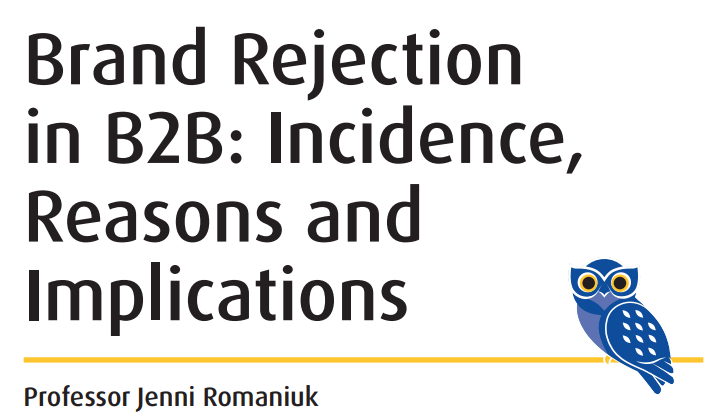Low brand awareness is a significantly bigger barrier to growth than brand rejection, according to new research.
The report found that B2B marketers should stop worrying about what people may not like about the brand and attempting to overcome it, and instead focus on customer acquisition as the key path to growth.
The study, LinkedIn’s marketing think tank, The B2B Institute, and the Ehrenberg-Bass Institute at the University of South Australia, looked at the preferences of 600+ buyers of business banking in the UK and 600+ buyers of business insurance in the US.
The ‘Brand Rejection in B2B: Incidence, Reasons and Implications’ report outlines the need for B2B marketers to reject imagined barriers to non-customers buying and embrace customer acquisition as the key path to growth.
By understanding the buying preferences of 600+ buyers of business banking in the UK (who considered 22 UK banking brands), and 600+ buyers of business insurance in the US (who considered 17 US business insurance brands), the research uncovered five primary insights:
1. Incidence of brand rejection is around 10% – Brand rejection averages at 11% for UK business banks and 7% for US business insurance firms, which is similar to the 9% found in similar B2C markets.
2. The majority of a brand’s past defectors will consider buying that brand again in the future – Defecting from a B2B brand does not mean a buyer is unwilling to buy from that company in the future. 2 in 3 lapsed B2B buyers of UK business banks, and 4 in 5 lapsed buyers of US business insurance companies, would consider buying from the brand they defected from again in the future.
3. 9 in 10 who have never been a customer do not actively reject a brand – The vast majority of a B2B brand’s non-buyers do not hold any negative attitudes that could be a barrier to becoming a future customer.
4. Lack of brand awareness is a 4-8x bigger problem than brand rejection, particularly for smaller B2B brands – Smaller B2B brands are small primarily because most potential customers do not know the brand exists. Surprisingly, even the most well-known B2B brands in the category had more potential customers unaware of the brand than active rejectors.
5. Reasons for rejection are wide-ranging and so would be very difficult to address – The most common reason for brand rejection in both categories is company history, but no single issue accounts for more than 20% of brand rejection. Therefore, using reasons for rejection as a basis for designing your sales or communications strategy will be difficult and unrewarding.
The author of the report, Professor Jenni Romaniuk, Research Professor and Associate Director (International) at the Ehrenberg-Bass Institute, the University of South Australia, comments: “The results of this paper are clear: brand rejection is not the reason why the vast majority of buyers do not buy a B2B brand. Put simply, B2B marketers should stop worrying about whether people dislike the company or if people are saying negative things to others. Instead they must focus on building memory structures so the brand is front of mind when they are in the market to make a purchase.”
Jann Martin Schwarz, Senior Director, Global Head of The B2B Institute, said: “This important research by one of the world’s leading marketing effectiveness scholars shows that many B2B marketers can’t see the wood for the trees when they focus on how they are being perceived. This data shows they are not being perceived at all by most of their potential buyers. Effective B2B marketing is first and foremost about increasing reach – making sure people know you exist.”
Source: www.MarketingScience.info

